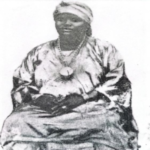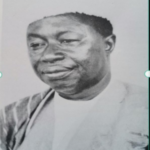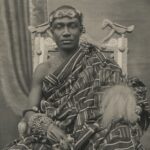
Nana Sir Osei Tutu Agyeman Otumfuo Prempeh II (1892- May 27, 1970) was Asantehene (ruler of Asante) from 1935-1970, defending the institutions of traditional rule through an epoch of radical change.
He was born in 1892 to Nana Akua Bakoma, daughter of Nana Yaa Akyaa, Queen-mother of Asante and to Okyeame Kwaku Owusu of Besease, near Edweso, 10mi (16km) east of Kumase. Christened Edward Prempeh Owusu, he was the nephew of Prempeh I (q.v). He was educated at Kumase Methodist School from 1907-1915. He was one of the founders of the Asante Kotoko Union Society in 1916. (At that time the organisation was primarily a literary society, but later its members joined with the Gold Coast nationalists, such as J. E. Casely Hayford (q.v), to campaign for the return of Prempeh I from exile in the Seychelles islands). Upon leaving school, his principal occupation was trading, and for several years he was a storekeeper. His business interests took him to Onitsha in Eastern Nigeria.
Prempeh I who had been allowed to return to Kumase in 1924, first as a private citizen and later as Kumasehene (ruler of Kumase), died in 1931. His nephew’s nomination to the Kumase stool was hotly contested by rival candidates, but he was chosen, and enstooled as Kumasehene with the title of Nana Osei Tutu Agyeman Prempeh II. His major preoccupation, on being elected Kumasehene, was to restore the Asante Union, which had disintegrated since 1896, when the British had marched on Kumase and exiled Prempeh I. His aim was achieved when the Asante Confederacy Council, later renamed the Asanteman council, was established, and Nana Prempeh II himself installed as Asantehene in January 1935.
His faith and courage, backed by the support of his people, enabled him to regain the Kumase lands belonging to the Golden Stool under the provisions of the Kumase Lands Ordinance of 1941. With the monies accruing from these lands, he encouraged traders, builders, farmers, cocoa firms, and mining and timber companies to invest in Asante. This policy brought general economic prosperity to the state, and paved the way for its educational advancement in the 1950’s and 1960’s.
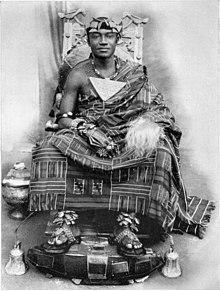
Nana Prempeh II participated actively in Gold Coast National affairs giving both advice and financial aid. He supported the Gold Coast and Asante delegation that travelled to London in 1934 to lobby against two bills – the Sedition Bill and the Waterworks Bill – that were seen as harmful to African interests. In 1936 -1937, he supported the Gold Coast and Asante farmers’ boycott of the European Cocoa pool, which had attempted to dictate the price of cocoa and to pay the lowest possible price for it. On the advice of Dr. J. B. Danquah (q.v), who was sent by the Joint Provincial councils to the Asante Confederacy Council, Prempeh II decided to reject the colonial government’s Ashanti Advisory Council Ordinance, which sought to separate Asante from the Colony. Instead, he supported the Asante-Colony Collaboration Movement, and informed the Secretary of State for Colonies, Colonel Oliver Stanley, during his visit to the Gold Coast in 1943, that Asante had decided to have a common legislature with the colony. The Burns Constitution of 1946, which provided for this, was thus a victory for Nana Prempeh II, who came to Accra to attend the inaugural meeting of the legislative council.
The nationalist fervour that arose in the Gold Coast after World War II was, however, too strong for Nana Prempeh’s liking. He was opposed to the radical politics of the younger generation, and tried to prevent them from demanding self-government by intimidating the members of the Asante Youth Association, who had joined the Convention People’s Party (C.P.P) of Kwame Nkrumah (q.v). He did everything he could to check the spread of nationalism, but when that failed, he backed the formation in 1954, of the National Liberation Movement (N.L.M), which was in opposition to the C.P.P. By publicly declaring his support for the N.L.M, he incurred the enmity of Nkrumah. The disturbances which took place in Asante between 1955 and 1957, when Nkrumah could not visit the region, resulted from the Asantehene’s backing of the N.L.M.
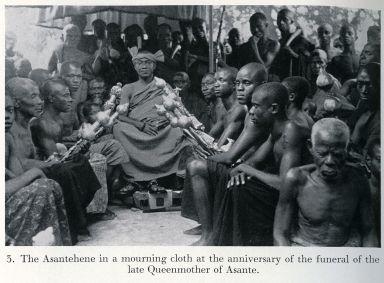
After the 1956 elections had returned the C.P.P to power, the Ghana became independent in 1957, the N.L.M joined with the Northern Peoples’ Party (N.P.P), the Togoland Congress (T.C) and other opposition groups, to form the United Party (U.P), which constituted the official opposition. Nkrumah then decided to cut Nana Prempeh down to size. He set up a commission to inquire into the affairs of the Kumase State Council, and harassed the supporters of the U.P. by deporting the aliens among them. He later carved the Brong Ahafo Region out of the Asante region, thus reducing the size of Asante. Nana Prempeh took this strong hint, and stopped backing the U.P. He gradually became a supporter of the C. P. P., and was regarded as a party traitor by the other U.P. leaders. From 1958 until his death in 1970, he took little part in national politics.
Apart from his political activities, he distinguished himself as a great and enlightened traditional ruler, receiving several national and international awards. The British government made him a Knight Commander of the British Empire (K.B.E.) in 1947, and he received decorations from Ethiopia (1960) and from Liberia (1968), while in 1965 His Holiness Pope Paul VI gave him a silver medal. The National Liberation Council (N.L.C.) awarded him the order of the Volta in 1969. In the same year he was elected by the national house of chiefs as its first President. From 1969-1970 he was a member of the Council of State, the highest council in Ghana’s Second Republic.
A. BRITWUM
